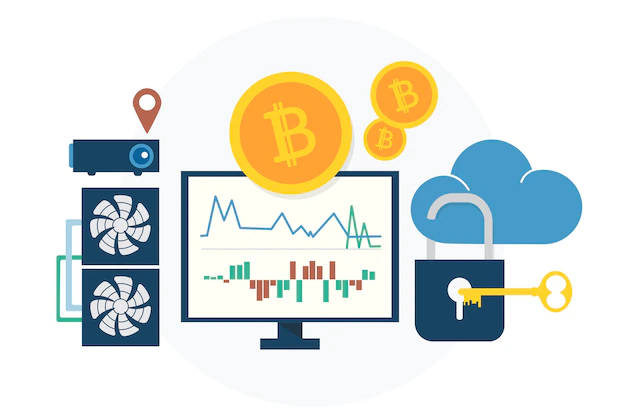Introduction: What is Cryptocurrency?
Cryptocurrency has revolutionized the way we think about money and finance. A digital or virtual form of currency, it uses cryptography for security and operates independently of central banks. With its meteoric rise in popularity, understanding cryptocurrency is more important than ever in 2025.
History of Cryptocurrency
Early Beginnings
The concept of cryptocurrency was first introduced in the late 1980s, but it wasn’t until 2009 that Bitcoin, the first decentralized cryptocurrency, was launched by an anonymous entity known as Satoshi Nakamoto.
Bitcoin’s Rise and Popularity
Initially dismissed by many, Bitcoin quickly gained traction due to its innovative technology and potential for financial independence. By 2025, Bitcoin remains the most valuable cryptocurrency.
Evolution of Altcoins
As Bitcoin paved the way, thousands of alternative coins (altcoins) emerged, each offering unique features and improvements on Bitcoin’s model.
How Cryptocurrency Works
Blockchain Technology
The backbone of cryptocurrency is blockchain technology—a decentralized ledger that records all transactions across a network of computers. This ensures transparency and security.
Decentralization and Its Benefits
Unlike traditional financial systems, cryptocurrencies operate on a decentralized network, reducing the risk of censorship, fraud, and manipulation.
Mining and Validation
Mining involves solving complex mathematical problems to validate transactions. In return, miners earn rewards in the form of cryptocurrency.
Popular Cryptocurrencies in 2025
Bitcoin
Bitcoin continues to dominate the market with its established reputation and widespread adoption.
Ethereum
Known for its smart contracts and decentralized applications (dApps), Ethereum remains a favorite among developers and investors.
Emerging Altcoins
New altcoins such as Solana and Avalanche are gaining traction due to their speed, scalability, and unique use cases.
Cryptocurrency Use Cases
Payment Systems
Cryptocurrencies offer a fast, secure, and borderless payment method, making them ideal for international transactions.
Decentralized Finance (DeFi)
DeFi platforms leverage blockchain technology to provide financial services without intermediaries, such as loans, savings, and trading.
NFTs and the Creative Economy
Non-Fungible Tokens (NFTs) have opened new opportunities for artists and creators to monetize their work directly.
Investing in Cryptocurrency
Why People Invest
Many are drawn to cryptocurrency for its potential for high returns, diversification, and as a hedge against inflation.
Risks and Rewards
While the rewards can be significant, investing in cryptocurrency is highly volatile and carries risks.
How to Start Investing
Starting with a trusted exchange and conducting thorough research is crucial for new investors. Tools like dollar-cost averaging can help mitigate risk.
Security and Regulations
How to Protect Your Wallet
Using hardware wallets, two-factor authentication, and strong passwords are essential for securing your cryptocurrency.
Global Regulatory Trends
Governments worldwide are introducing regulations to ensure transparency and prevent misuse, while maintaining innovation in the crypto space.
Role of Centralized and Decentralized Exchanges
Centralized exchanges offer user-friendly interfaces, while decentralized exchanges provide greater privacy and control over funds.
The Future of Cryptocurrency
Predictions for the Next Decade
Experts predict greater adoption, integration with traditional finance, and advancements in scalability and sustainability.
Integration with Web3 and the Metaverse
Cryptocurrency will play a pivotal role in the development of Web3 and metaverse ecosystems.
Potential Challenges Ahead
Scalability, environmental concerns, and regulatory hurdles remain challenges for widespread adoption.
FAQs
- What is the safest way to store cryptocurrency?
The safest method is using hardware wallets, which are offline and less vulnerable to hacking. - Are cryptocurrencies taxed?
Yes, most countries tax cryptocurrency gains as either income or capital gains. - What is the difference between coins and tokens?
Coins operate on their own blockchain, while tokens are built on existing blockchains like Ethereum. - How can I start mining cryptocurrency?
You’ll need specialized hardware, access to affordable electricity, and mining software. - Are cryptocurrencies environmentally sustainable?
Some cryptocurrencies, like Bitcoin, have high energy consumption, but newer models like proof-of-stake are more eco-friendly. - Is cryptocurrency a good long-term investment?
While it has potential, investors should be prepared for high volatility and conduct thorough research.
Conclusion
cryptonewzhub.com has transformed the financial landscape, offering new opportunities and challenges. By staying informed, you can navigate this evolving world with confidence. Start exploring today!

